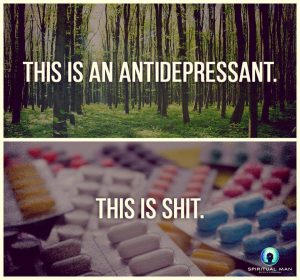Don’t Stigmatize Mental Health Medication
There are many ways that people cope with and treat mental illnesses, whether it be different types of mental health therapy, meditation, exercise, or medication. The list could go on and what it shows is that for each person something different will work. It’s part of the complex nature of these illnesses and part of the mystery that still needs solving.
The Problem With Stigmatizing Mental Health Treatments
 There’s been a post circulating around Facebook lately made up of two images. The top image is of a forest and over top are the words “this is an antidepressant;” the bottom image is pills and the words over top of that say “this is s**t.” The problem with the image is it suggests one method of treatment is better than the other and, worse, that nature is an appropriate form of treatment and medication is not.
There’s been a post circulating around Facebook lately made up of two images. The top image is of a forest and over top are the words “this is an antidepressant;” the bottom image is pills and the words over top of that say “this is s**t.” The problem with the image is it suggests one method of treatment is better than the other and, worse, that nature is an appropriate form of treatment and medication is not.
The problem goes back to what works for some people might not work for others. If nature helps with your depression, that’s wonderful. Personally speaking, nature doesn’t do a thing for my depression, neither does exercise or mindfulness or a lot of the other things people recommend. I’ve never tried medication, but that doesn’t mean I’m going to knock it.
Why?
Because it works for some people. I’ve heard a lot of horror stories about people not taking well to medications, but for others it’s exactly what they need to help them feel balanced, to help them function, and to help them feel “normal.”
Who am I to say what helps them out is s**t?
When to Speak Out Against Mental Health Medication
The only time I would say mental health medication is for sure awful is if there are studies to back it up. If a medication absolutely works for no one and only makes things worse, then that’s bad. If studies prove that it’s filled with dangerous levels of poison, then run it into the ground.
We definitely need healthy and safe treatments available for mental health treatment, but that doesn’t look the same for everyone.
The Effects of Stigmatizing Mental Healthy Medication
When we say one method of treatment is right and another method of treatment is wrong, it adds to the shame people feel about having to take medication in the first place. Many people who take medication already feel screwed up without someone saying they should feel that way based on treatment type. To go from bad to worse, that person might stop taking medication because of it and get worse again.
What we should be doing is encouraging people to get treatment and find what works for them. Just because we don’t agree with it and it might not be something that works for us doesn’t mean it’s inherently wrong.
You can find Laura on Twitter, Google+, Linkedin, Facebook and her blog; also see her book, Project Dermatillomania: The Stories Behind Our Scars.
APA Reference
Barton, L.
(2016, October 16). Don’t Stigmatize Mental Health Medication, HealthyPlace. Retrieved
on 2026, March 5 from https://www.healthyplace.com/blogs/survivingmentalhealthstigma/2016/10/dont-stigmatize-mental-health-medication
Author: Laura A. Barton
How many times have you heard the expression "keep taking the tablets" as a put
down/joke. Is this not an example of how dismissive some people as to the serious nature and treatment of mental illness.
I don't know that that's so much stigmatizing medication as the one taking it. Either way, it's not good, I agree.
Thank you Laura! You said perfectly what has needed to be said for so long! It is bad enough to suffer the stigma of mental illness, but let someone who is already suspicious find out one is taking medicationfor their illness and lid to Pandora's Box is slung wide open, leaving the person who is suffering ripe for attacks from every direction!
I have had so many ask me why I just don't go to a therapist or visit a clergy person, what exactly does that medicine DO for you, how do you even know it is working, I bet if you tried harder or prayed more you could handle your"problems" without "drugs". Notice how people take medicine for every other illness, but those with mental illness take drugs? I have been shunned and shamed when people have found out about my depression and anxiety and ridiculed or given up for addiction and just plain weakness if my medication becomes common knowledge. After working so hard to hide my mental illness, I've found I have to work doubletime to make excuses for my medicine. My own daughter-in-law went so far as to TELL me ' to be mindful where I take my medication, taking care the children don't see me. They will begin to ask questions and she doesn't want to lie to them about why I take pills'!
